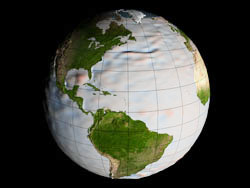Microtubules need a helping hand to find chromosomes in dividing egg cells, scientists have discovered. Although it was generally accepted that microtubules act alone as the cellular ropes to pull chromosomes into place, a new study by researchers at the European Molecular Biology Laboratory (EMBL) shows that this is not the case. They found that in large cells such as animal eggs, something else is needed to move the chromosomes into the correct location – fibres of the cytoskeletal molecule actin
Unusually preserved fossils shed new light on how macroscopic, complex life evolved and lived 550 million years ago
Scientists interested in ancient life have a wealth of fossils and impressions frozen in rocks that they can study from as far back as 540 million years ago – when animals with shells and bones began to become plentiful. But evidence of complex life older than 540 million years is scant and difficult to study.
Now, a research team from Virginia Tech in

Stories of two-headed serpents and epic battles between Thunderbird and Whale, common among Northwest native peoples, have their root in the region’s seismic history. New research led by a University of Washington scientist has found stories that could relate to a large Seattle fault earthquake around A.D. 900 and specific eyewitness accounts linked to a mammoth 1700 earthquake and tsunami in the Cascadia subduction zone.
The stories come from people living in areas from nort
For the first time, NASA has the tools and expertise to understand the rate at which sea level is changing, some of the mechanisms that drive those changes and the effects that sea level change may have worldwide.
“It’s estimated that more than 100 million lives are potentially impacted by a one-meter increase in sea level,” said Dr. Waleed Abdalati, head of the Cryospheric Sciences Branch at NASA’s Goddard Space Flight Center, Greenbelt, Md. “When you consider this information,

For the first time, researchers have the tools and expertise to understand the rate at which sea level is changing and the mechanisms that drive that change.
Sea levels rise and fall as oceans warm and cool and as ice on land grows and shrinks. Other factors that contribute to sea level change are the amount of water stored in lakes and reservoirs and the rising and falling of land in coastal regions.
“From the Mississippi Delta to the Maldives Islands off the coast of Indi
The Gulf of Mexico, 130 miles south of Galveston, Texas — An international team of marine research scientists working for the Integrated Ocean Drilling Program (IODP) have found new evidence that links catastrophic sand avalanches in deep Gulf waters to rapid sea level changes. By analyzing downhole measurements and freshly retrieved sediment cores, IODP scientists are reconstructing the history of a basin formed approximately 20,000 years ago, when sea level fell so low that the Texas shor